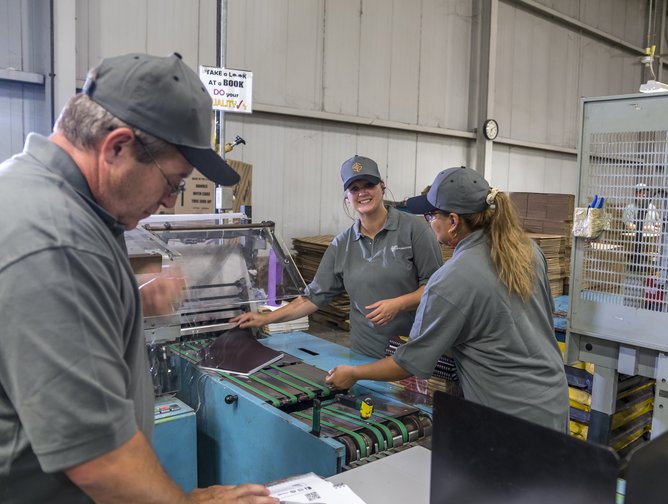LSC Communications: Supply Chain as a Service solutions for the digital transformation of publishing
In its present incarnation, LSC Communications is just over two years old having been created out of the book, magazine, catalogue and office products printing businesses of RR Donnelley. That business was founded in 1864 and became recognized as the founder of the American high quality, high volume book printing industry. Its sought-after Lakeside Classics imprint is now maintained by LSC and is a benchmark for the impeccable attention to product excellence and design that epitomizes the company.
Not so long ago, printing was thought to be a dying industry as electronic means of delivering content, whether educational or general, made inroads. Certainly, some impact was felt, however in the last year or two book sales have rallied and LSC’s President of Book Division, Dave McCree, is insistent that the fundamentals of the print market are healthy – a sound basis on which to build the many added value services the company is now able to offer. “Someone suggested to me the other day that we are a 155-year-old startup – I love that! We are a smaller, leaner and more agile organization focused on specific markets.”
An evolving marketplace
Traditionally, most publishers have tended to outsource the printing of their books or educational materials but have kept marketing, distribution, warehousing, order fulfillment and customer relations in-house. Some, especially academic presses, even printed their own books. This mindset has been slow to change, but increasingly the household names in publishing are coming to appreciate the advantage of outsourcing more of their non-core work – and LSC is keen to seize this opportunity. “We have moved from an old-style print manufacturer to what you might call ‘Print Plus’. We are building the services side of our business to complement the manufacturing side.”
The traditional core business model of printers like LSC was to work with publishers to help them find ways to reduce costs. Printing was regarded as a production cost, to be pared down wherever possible on the principle of lean manufacturing. In those days, LSC won business through competitive pricing, dependable quality and above all service – now, McCree insists that the same attention to the client is being extended right through to the supply chain. Responsibility no longer ends with the finished product but goes right through marketing and sales, distribution and cash collection. “We help publishers sell more books as well as driving the cost of their production down. That is really the focus of our strategy: saving cost and creating efficiency along the supply chain at the sales and marketing end also helps them to sell more products. It’s a double winner for the client enabling them to sell more product while producing it faster through our proven print capability.”
The conversation is no longer about traditional offset versus digital printing – LSC can handle any volumes in either format – but more about e-services, warehousing and fulfillment as well as supply chain management. LSC’s clients include educational giants like McGraw-Hill, Pearson, Houghton Mifflin Harcourt, new edtech players like Amplify, general publishers such as Random House and HarperCollins as well as niche players like Workman Publishing and Abrams. It is also a major printer of bibles and religious books. “These are all very different businesses, but they all need both product and services,” says McCree. “We set out to be more intimate than the average large printing organization by making sure we are meeting the needs of each one of those clients wherever that need might be. They knew we could manufacture a book for them; now we are managing their warehousing as well, distributing their product from our warehouses across the USA, and even handling the back-end collection and cash applications within their business.”
Exploring new publishing landscapes
Surprisingly perhaps, confirms Books Division SVP Michael Shea, the fastest-growing book sector last year was in hardbacks. In 2018, the American Association of Publishers (AAP) reported that despite the success of e-books, the case bound books segment grew by 6% while e-books declined by 4%. While this trend sustains the core printing capability of LSC, the biggest potential lies in innovation: specifically, the provision of value-added services that enable publishers to offload the purely administrative aspects of book delivery.
Publishers may have previously been constrained by a traditional mindset but today, the benefits of consolidating warehousing and order fulfillment are driving change, no doubt stimulated by the Amazon model. LSC has expanded its warehousing capacity to meet this demand and now has a spread of facilities over the Midwest and East Coast. The LSC book fulfillment footprint now totals more than 3.7 million sq. ft. of operating space, serving clients in all of its market sectors. Most recently, LSC has acquired Elsevier’s warehousing and distribution facility in Missouri to strengthen its full range of supply chain services for publishers of both printed and electronic books. It’s a great demonstration of the new service model, says McCree, in partnership with one of the world’s leading publishing houses.
Educational technology, or edtech, is a fast-expanding and very fluid area of content delivery, explains Shea. “There are hundreds of new and disruptive startups, attracting billions of dollars in investment, challenging established players like Amazon, Apple, Google and Microsoft.” These companies are seizing on technologies like virtual reality (VR), artificial intelligence (AI) and audio-visual (AV) tools delivered using cloud technology – but while this has disrupted print, it hasn’t replaced it. “We found there wasn't the network infrastructure to support all this digital delivery. There was an ongoing request and requirement for printed material – as the digital curriculum develops it is supplemented with print, and the print component has continued to grow pretty dramatically. We are working with the most advanced clients and publishers in that space, at the school and college level, including the providers of open educational resource (OER) material such as California State University’s MERLOT project, which publish low-cost printed books to supplement online content,” Shea adds.
OpenStax, a nonprofit edtech initiative based at Rice University makes textbooks available in free digital formats and at a low cost in print. LSC prints a significant number of these core textbooks, mostly at the freshman and sophomore level, which sell at a fraction of the cost of the mainstream equivalents. “OpenStax has really changed the economics of making printed material available to students,” he explains. All of these initiatives benefit from LSC’s unrivaled digital print capacity. Even more importantly though, the very complexity and immediacy they have brought to the University Press underlines the need for the comprehensive service platform the company has developed to manage the logistics and fulfillment aspects of the entire supply chain.
Partnership in technology
Brittyne Lewis, who looks after side of the business that deals with metadata, audio, artificial intelligence, retail data tracking, and digital technologies, was keen to explain the ways in which technology has disrupted the information market. “Every year something new comes up whether it's from publishers’ prospectuses, how Amazon, Google and Apple are operating or new data being available,” says Lewis. “Data presents a big challenge. The retail industry, for example, has been able to capture a lot of customer data, but in the publishing space that hasn't really happened to the same extent – yet. So I’d say we aim to help publishers to navigate the digital landscape.”
To make this possible LSC is exploring and growing every opportunity. In the summer of 2018, it took the first step and investing in an AI tech start-up focused on the publishing and media industry, with an eye towards providing target audience data to drive marketing strategies. LSC has also developed a publisher-facing platform called HarvestView designed to increase book discoverability and help optimize books for sale online. This is key to publishers’ success both on Amazon and other e-tailers given the multitude of brick-and-mortar closures over the years. It will strengthen LSC’s leadership position in content logistics, distribution and monetization across all formats, channels and platforms.
LSC has morphed into a solutions provider, Lewis continues. No longer simply the output partner for a printed book, it now provides tools that enable strategy formulation and efficiencies in the supply chain. A good example would be the multi-year supply chain services agreement it signed in December 2018 with the United Church of Canada, under which it will provide a range of distribution services from LSC’s Newmarket, Ontario location.
Nimble, agile – and dependable
Michael Shea is determined that LSC will continue to leverage best-of-breed technology solutions to serve its clients. To address the age-old problem of piracy in global textbook publishing, the company worked with a long-standing partner in print and in July 2017 LSC launched its IntercepTag solution, delivering a platform for verifying textbook authenticity through the scanning of secure unique identifier codes. The platform uses HP’s tried and tested Link Technology for product authentication to help protect intellectual property and fight counterfeiting throughout the entire supply chain. Publishers can apply an IntercepTag serialized mark, a unique anti-piracy identifier code, on each book at the time of production via a label or digitally printed cover. “It’s a tangible demonstration of our robust Supply Chain as a Service (SCaaS) offering,” emphasizes McCree. “We are committed to helping protect our clients’ intellectual property and to support technology innovation within the supply chain. As we look to roll out Phase II of our IntercepTag solution, we will now be looking to help our clients link directly with their end customers, the consumers.”
He summarizes his position with a powerful statement of the strategy that will define LSC in the digital age. “When people think of LSC, and specifically the LSC book business, they think of us as a printer. I don’t want to under-emphasize that. It is an important aspect of who we are and it is a critically important business that is growing strongly again after a flat period. That said, we are looking at an incredibly exciting time over the coming years. By capturing more and more of the supply chain services, fulfillment, distribution and warehousing side of our clients’ businesses, they can focus on their core business of content creation, editorial and sales that will only create more opportunities for us to work in partnership with them as they attempt to utilize Amazon and other e-marketplaces.
“The new entrants to publishing and the technology marketplace that we have been talking about only add to that excitement. Printing has certainly changed, and we are leading that change. There’s a significant change, with a move from long runs and putting stock into a warehouse to more dynamic, agile digital print. We see it as an inventory-on-demand scenario, which is a really good fit with our business. After all, we already have one of the largest digital print capability in the marketplace.”
Thus, LSC retains its commanding position in the market as a dependable printer that anyone with a printed product needs to be talking to, while evolving into a very significant service partner, helping publishers around the world with whatever they need to get their product to market and into the hands of the end customer.




